A History Blog Looking At The More Offbeat People and Moments from the Past Now with Ko-Fi! Ko-fi.com/espanolbot
Don't wanna be here? Send us removal request.
Text

One of roughly 5000 "Wanted for Treason" posters created and distributed by Robert Surrey, an associate of the McCarthyite Major General Edwin Walker, who would give speeches about his conspiracy theories about how the US government had been infiltrated by communists.
These flyers were distributed in and around downtown Dallas in the days leading up to Kennedy's assassination on 22 November 1963, placed on car's wind-shields and tucked within the pages of two of the city's anti-Kennedy newspapers.
Prior to Kennedy's decision to travel to Dallas, he was warned six times not to travel to the city, due to growing unrest caused by racism (due to the advances made in civil rights under JFK), anti-communist rhetoric spouted by right-wing cranks like Walker, and anti-catholic bigotry aimed at Kennedy for being America's first Catholic president (with groups like the John Birch Society claiming that he was secretly being controlled by the Pope, which is some 1600s kinda bigotry there).
Additionally, due to Kennedy wishing to reassess America's oil production, JFK hinted in Feburary 1963 that Texan oil barons could loose their "oil depletion allowance", a tax loophole that allowed the oil industry to keep 27% or so if their revenue tax free, meaning that they potentially stood to have losses of $300m. This naturally angered oilmen like Nazi-sympathiser Haroldson L Hunt who used their fortune to spread anti-Kennedy propaganda, which all came for naught as following Kennedy's death his successors abandoned discussion of getting rid of the allowance regardless.
Now this doesn't mean necessarily that there was a conspiracy to assassinate Kennedy, just that when it happened a lot of people weren't really very surprised considering he had been warned in advance about there being a lot of racist, Bible Belt cranks there being fed propaganda by right wing wealthy businessmen concerned that they enormous fortunes might theoretically be reduced slightly.
13 notes
·
View notes
Text
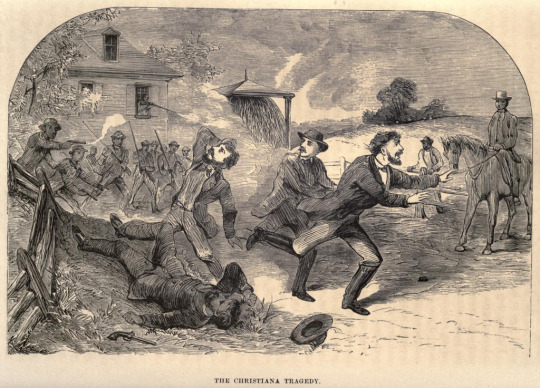
In the early hours of the morning of 11th September 1851, a federal marshal approached the home of escaped slave William Parker in the town of Christiana, Pennsylvania.
Thanks to the Fugitive Slave Act of 1850s, it was now legal for people from slave states to travel into states where slavery was illegal to kidnap former enslaved people (or people whom they could claim to be escaped slaves to sell in the Southern States, such as what happened to Solomon Northup, of 12 Years A Slave fame, albeit prior to the Act itself) to return them to their "owners", in addition to the Act introducing harsh penalties for those harbouring escaped slaves or assisting in their escape and requiring free state officials to assist in the slave hunters' activities.
Now, the town of Christiana had a population of mostly freed and escaped African American people, and as such was subject to frequent raids by Southern slave hunters and their Northern collaborators, and for the past twenty yeas a successful resistance movement had formed to repel these attempts to kidnap people, with the current leader of the resistance being the aforementioned William Parker.
It was due to this resistance movement, an agent of the Special Secret Committee as Thomas Slaughter's 1991 book Bloody Dawn: The Christiana Riot and Racial Violence in the Antebellum North called it, Samuel Williams, spotted slave owner Edward Gorsuch recruit two Philadelphia police officers as he was gathering a posse as he planned to come to Christiana to kidnap four of Gorsuch's escaped slaves.
So when Gorsuch, the cops and his other slave hunters arrived at Parker's home, he found the home both heavily fortified and filled with heavily armed African American folk with their white Quaker neighbours and allies. Gorsuch, perhaps predictably for a racist, assumed that the Parker's white allies were actually the people in charge and tried addressing them in an attempt to say that, legally, they had to hand over his "property".
One of the aforementioned escaped folk, Samuel Thompson, was then physically confronted by Gorsuch, with Samuel promptly clubbing him to the ground, where he was swiftly shot to death. Gorsuch's son, Dickinson, attempted to rescue his father, only to get shot multiple times too, and had to be dragged to safety by a member of the slave hunter posse, who then fled under a hail of bullets.
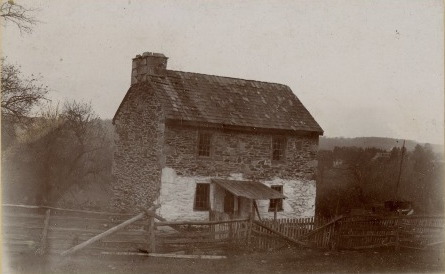
Following the Christiana Incident (or Riot or "Tragedy" if you're from a slave state), Parker, the escaped slaves, and some of the other black resistance members fled to Canada, with Parker making a stop at the home of Frederick Douglass along the way. The response of President Millard Fillmore was to call in the marines, where they arrested 36 blacks and five whites, and promptly charged them with treason in an attempt to make an example of them.
The government decided that Castner Hanway (sometimes spelled Hanaway), one of the white men charged, was "obviously" the ringleader... only for the jury to find him not guilty after 15 minutes deliberation (with some interpreting this as meaning that the anti-slavery group's use of violence was justified, and others arguing that they it was absurd to argue that a bunch of poorly armed Quaker farmers had decided to wage war on the United States). Likewise all of the other people, including the black people, were also acquitted.
The Christiana Incident is held up as one of the many, many contributing factors to the start of the American Civil War (with Southerners being angered at the North for not convicting/executing anyone for Gorsuch's death, while the Northerners arguing that a slave owner being able to enter a Free State and commandeer a bunch of cops by force to help him kidnap people as an example of the Southerners' political over reach), but a direct link to the wider history of the United States comes after Gorsuch's youngest son, Thomas.
Thomas was also present at the Christiana Incident, and would bitterly complain to his friend and classmate, a member of a famous acting family by the name of John Wilkes Booth, about his family being "robbed of justice" over the matter of his father's death. Some, such as the podcast Last Podcast on the Left, highlight this connection to Christiana as the possible point where Booth was radicalised the actor from being just another petty racist among many to being the kind of petty racist who'd murder people in defence of the idea of racism.
23 notes
·
View notes
Text

Oh hey, it's Dracula Day! As such, here's a tangentially related historical Dracula fact.
The the play of Dracula, called Dracula, or The Un-Dead, was a production was both written and directed by Bram Stoker himself in order to secure the stage rights to his novel, lest they get get sniped by someone else. Mina in the play was portrayed by the actress Edith or Edy Craig (main image), who was herself a fascinating person in many respects.
Edy was herself an outspoken socialist, feminist, suffragist, actor, costume designer, theatrical producer, AND poly lesbian, who was in a decades long relationship with her partners playwright and author Christopher St John (born Christabel Marshall) and the artist Clare "Tony" Atwood until Craig's death in 1947.
It's somewhat interesting considering more recent queer interpretations of the characters Mina Harker and Lucy Westernra in Dracula, that historically the first depiction of Mina in a non-book medium was literally portrayed by a lesbian actress... albeit while Craig and Stoker did work out of the Lyceum Theatre at the same time (Craig as an actor and then costume designer, Stoker as business manager), Edith and Christopher didn't become a couple until roughly the year after the novel had been published.
Marshall and Atwood were buried next to each other when they eventually passed away (in 1960 and 1962 respectively), although tragically while Craig was meant to be buried with them, someone reportedly lost her ashes so a memorial was placed there instead.
5 notes
·
View notes
Text

St. Anthony Comstock, the Village nuisance by LM Glackens for Puck Magazine (1906)
Cartoon mocking pro-censorship activist Anthony Comstock, whose deserve to eliminate what he deemed to be smut started with bookshops and swiftly began to target writers who write about reproductive health, books of art history (because of the pictures of nude statues and paintings), and activists for sexual freedom (primarily women and folk promoting women's rights).
Comstock boasted that he was responsible for thousands of arrests and that he had personally driven 15 people to suicide in prison, describing himself as "the weeder of God's garden". He would also personally lead police raids on "offending" doctors and abortion providers, where he'd write to them describing a sexual health issue or requesting contraceptives, and once the doctors had entrapped themselves he'd have them (and in one case, a 17 year old girl who had been impregnated by her much older boss and was in the middle of a procedure when the cops burst into the room) arrested and sent to prison.
While celebrated by many conservatives both at the time and since, many people saw the... enthusiasm he had for his crusade and the glee he got from persecuting people to be, to be honest, kinda weird.
Thus leading to mockery of his "prudishness" like the main image and with mystic and women's rights activist Ida Craddock describing him with the following passage in the final letter she wrote in prison before her death.
As I said not long since in the Boston Traveler, if the reading of impure books and the gazing upon impure pictures does debauch and corrupt and pervert the mind (and we know that it does), when we reflect that Anthony Comstock has himself read perhaps more obscene books, and has gazed upon perhaps more lewd pictures than has any other one man in the United States, what are we to think of the probable state of Mr. Comstock's imagination today upon sexual matters? The man is a sex pervert; he is what physicians term a Sadist--namely a person in whom the impulses of cruelty arise concurrently with the stirring of sex emotion. The Sadist finds keen delight in inflicting either physical cruelty or mental humiliation upon the source of that emotion. Also he may find pleasure in gloating over the possibilities to others. I believe that Mr. Comstock takes pleasure in lugging in on all occasions a word picture (especially to a large audience) of the shocking possibilities of the corruption of the morals of innocent youth.::
4 notes
·
View notes
Text

From the Depths by William Balfour Ker, c. 1906
Summary via the Library of Congress,
Print shows a lavish social event in a large ballroom attended by the well-to-do; the party is disrupted when a fist erupts through the floor, beneath which are the struggling masses of the less fortunate who provide the foundation support on which the wealthy rest.
An example of art from the Gilded Age.
72 notes
·
View notes
Text

There's a lot of interesting things to be said about American politician and lawyer James Otis Jr. (1725-1783). There's how he is often credited with coining the slogan "taxation without representation is tyranny", for example. Or his struggles with his mental health, which alienated him to a lot of his contemporaries.
As probably did his condemnation of the slave trade and the racist ideas that enforced it with his believing that black people had inalienable rights, and he favoured extending the freedoms of life, liberty, and property to them..
There is however, a reported family story where he supposedly told his sister Mercy, "I hope, when God Almighty in his righteous providence shall take me out of time into eternity, that it will be by a flash of lightning".
And, sure enough, while visiting a friend in the midst of a thunderstorm, Otis was struck by lightning while standing in a doorway, killing him near instantly.
23 notes
·
View notes
Text

In 1983, a series of memos were exchanged between members of Margaret Thatcher's British government suggesting a potential plan of what to do with the population of Hong Kong who might not want to return to the rule of mainland China once Britain's 156 rule of the area came to a close...
Namely, taking the suggestion by Reading University sociology lecturer Prof. Christie Davies, an expert in the sociology of morality, censorship and humour, seriously... by relocating the entire 5.5m population of Hong Kong and placing them in a newly built city state in Magilligan, between Coleraine and Derry in Northern Ireland, he said, because "the colony’s population would have no political future after the territory reverted to Chinese rule in 1997" and because it would revitalise the stagnant Northern Irish economy.
A Northern Ireland civil servant, George Fergusson, seized upon Davies (not serious) suggestion, and began "enthusiastic" discussions with the Foreign Office over the feasiblity of the plan, with a file entitled The Replantation of N. Ireland from Hong Kong records the exchanges – the title echoes the 17th-century settlement, or “plantation” of Scots in Ulster by King James I.
As the Guardian article explains,
“If the plantation were undertaken,” Fergusson wrote, “it would have evident advantages in reassuring Unionist opinion of the open-ended nature of the Union.” American doubts about the scheme would be assuaged by the “possibly happy outcome to the uncertainties currently surrounding Hong Kong”. He continued: “We are undecided here whether the arrival of 5½ million Cantonese would make government policy [on devolution] … more or less easy to implement. Arithmetically, recognition of three identities might be thought more difficult. “On the other hand, the newly arrived ‘third’ identity would be hard not to recognise and this in turn might lessen the scale of the problem in recognising the other two.” There were legal precedents, Fergusson added: “If Gibraltar and Falkland Island inhabitants … may be EC citizens, how could Brussels … seriously object to the inhabitants of Hong Kong, particularly if they were living in the Magilligan area?” Fifty Chinese families from Vietnam had been resettled in Craigavon and Coleraine already, he pointed out. “It has at least established that the Chinese do not find the Northern Ireland climate objectionable and that they can get on reasonably well with the current inhabitants.” Fergusson said there would be a need to liaise with the Treasury, Home Office and Hong Kong itself. “At this stage we see real advantages in taking the proposals seriously,” he commented. There would need to be planning applications on a confidential basis.
Now, obviously when the exercise was treated as a spoof proposal by the British government officials involved when the file was made public, with former British official David Snoxell, saying that the memos were a "joke between officials", and that he’s shocked that anyone took his exchange of letters with Fergusson seriously.
If, hypothetically the plan would have gone ahead, in the midst of the Troubles no less the history of Ireland and the UK would have gone VASTLY different, for a number of reasons, not least the transplantation of over five million British citizens into Northern Ireland would have dwarfed the native population (approximately 1.5m) in ways that might have led to... tension.
For example, in real life while the number of people of Chinese descent in Northern Ireland is nowhere near five million people, there have been folk from Hong Kong who moved to Northern Ireland and got involved in local politics. One such person being Anna Lo, originally from Hong Kong, moved to Belfast in 1974, eventually becoming a Stormont assembly member for the Alliance party. However, in 2014 she announced last year that she would stand down because of racist attacks by loyalists over her criticising a North Belfast pastor for describing Islam as "Satanic".
So yeah, in no way feasible and possibly resulting in terrible long effects if it were to happen (like the plan to put a dome over Manhattan in the middle of the period where leaded petrol was destroying everyone's brains), but an interesting concept for an alternate history story regardless.
7 notes
·
View notes
Text
In 1736, I lost one of my sons, a fine boy of four years old, by the small-pox, taken in the common way. I long regretted bitterly, and still regret that I had not given it to him by inoculation. This I mention for the sake of parents who omit that operation, on the supposition that they should never forgive themselves if the child died under it: my example showing that the regret may be the same either way, and that, therefore, the safer should be chosen.
From Benjamin Franklin's posthumously-published autobiography, where he expresses regret that he didn't have his four year old son, Francis Folger Franklin, vaccinated against smallpox when he had the chance, which led to their death on November 21st 1736, in Philadelphia.
201 notes
·
View notes
Text

In 1957, as part of the worldwide Atoms for Peace program, the United States launched Project Ploughshare, an intiative designed to try and find a peaceful, constructive use for the ever expanding amount of nuclear warhead that America was accumulating as the Cold War pressed on.
These ideas included,
1958's Project Chariot, a proposed plan where six hydrogen bombs would be detonated near Cape Thompson in Alaska to create an artificial deep water harbour.

1963's Project Carryall, where United States Atomic Energy Commission (AEC) proposal to use 23 nuclear explosives to excavate a path for Interstate 40 (I-40) and the Atchison, Topeka and Santa Fe Railway (AT&SF) through the Bristol Mountains of southern California.

And a 1963 memo from the Lawrence Livermore National Laboratory would have used 520 2-megaton nuclear explosions to excavate a canal through the Negev Desert in Israel to create a US-owned alternate route to the Suez Canal.

Obviously none of these plans ever actually made it to completion (to the annoyance of Edward Teller, the scientist who proposed Project Chariot), although the irony of partially nuking sections of Israel and Palestine in the name of peace and capitalism while thinking there would be no repercussions was apparently lost on them.
However, as a result of the testing of nuclear weapons in New Mexico under Ploughshare, as part of a 1961 experiment named Project Gnome, seeing, among other things, whether the steam created from an atomic explosion could be used to generate electricity, did have some real world side-effects, such as surrounding towns being subject to fallout and irradiated drinking water, which, naturally lead to public outcry.
Project Ploughshare was eventually discontinued in 1977, following the detonation of 35 different nuclear weapons in 27 different tests, with the Soviet Union's equivalent program, Nuclear Explosions for the National Economy, which detonated bombs in 124 tests until its end in 1989.
13 notes
·
View notes
Text

Oh hey, It's JJR Tolkien's birthday! This calls for a random historical fact I think.
In 1965, an American company, Ace Books, determined that due to an error with the company that imported Tolkien's work to the US, Houghton Mifflin, had not actively renewed the American copyright on the Lord of the Rings following their initial 1955 publication, the books thus fell under public domain in the US and thus they were allowed to publish their own editions without paying Tolkien royalties.
Notably Tolkien himself was reportedly not a fan of the relatively new paperback format, he originally wanted to public LOTR as a single volume and had previously told co-owner of Ace Books, Donald Wolheim, that he felt the medium "degenerated the form" of his stories when they previously approached him.
Ace Books published their version of the trilogy, selling over 100,000 copies. This far outpaced anything Houghton Mifflin had seen. The price of the paperbacks was far more competitive at just 75 cents per book.
When Tolkien learned of the pirated editions of his book, he would actively tell fans not to buy those versions due to the rights issues, and would have official versions of his books published with the "Authorised Edition" subtitle (albeit he wasn't happy about the cover art).
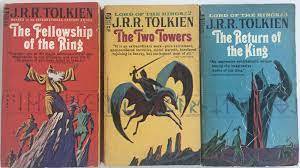
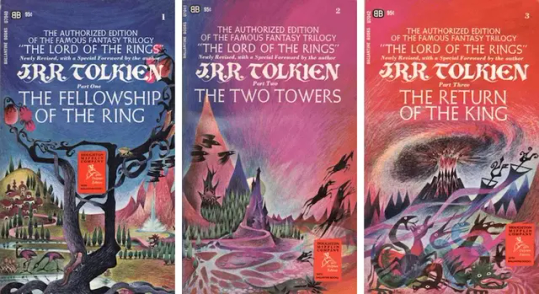
Eventually the decision was made that Tolkien could renew the US copyright on LOTR if he were to resubmit them with new material, and eventually Ace Books did come to an agreement with the author over paying him a license to distribute the novels within the United States. Thus ending what the press over-dramatically named "War over Middle-earth".
8 notes
·
View notes
Text
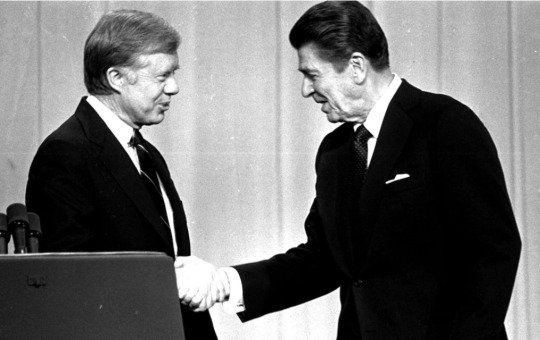
Many consider a contributing factor to the late Jimmy Carter's 1980 presidential election loss to Ronald Reagan was his seeming inability to resolve the Iranian Hostage Crisis, where between 1979 and 1981 Iranian students seized the US embassy and captured 53 members of staff and civilians.
However, just it turned out that Richard Nixon and Henry Kissinger had sabotaged Lyndon B Johnson's peace talks with Vietnam some years previously for political gain, Reagan's allies decided to insert themselves into the Hostage Crisis to aid him the exact same way.
Specifically, former Republican governor of Texas John Connally, who met with leaders in the Middle East in the summer leading up to 1980 election. His goal? Convince the leaders of the various countries he visited to ask the students in the embassy to ignore Carter's attempts to free the hostages, as Reagan would get them a better deal when he won instead.
Carter would go on to loose that election, with voters citing his inability to resolve the Hostage Crisis and a stagnating economy for his loss of support, with the hostages were eventually released on 20 January 1981, the day Reagan took office.
As a Guardian article recounting the statements of Ben Barnes, an assistant to Connally during the 1980 trips, puts it:
“History needs to know that this happened,” Barnes said in one of several interviews with the Times. Barnes said he decided to come forward with his account after news last month that Carter, 98, had entered hospice care at his home in Plains, Georgia, after a series of hospital visits. “I think it’s so significant and I guess knowing that the end is near for President Carter put it on my mind more and more and more,” Barnes said. “I just feel like we’ve got to get it down some way.” Barnes – a Democrat who served as lieutenant governor of Texas and was vice-chair of John Kerry’s 2004 election campaign – told the Times that on returning from the Middle East, Connally reported to the chairman of Reagan’s campaign, William J Casey. “Carter’s aides have long suspected that his campaign was torpedoed by Reagan affiliates who wanted to delay the release of American hostages until after the election,” Axios wrote on Monday. It added: “Ronald Reagan’s subsequent presidency ushered in a conservative era that remains a model for Republicans. If Carter had secured the release of the hostages, he might have won instead.”
34 notes
·
View notes
Text

While British celebrities ranging form Ian McKellen to Basil Brush have appeared in pantomimes over the years, the traditional Christmas plays have also had a number of celebrities over the years. The first seemingly being George Takei, who played the Genie in a 1987 production of Aladdin in Reading's Hexagon theatre.
Amusingly, while actors ranging from David Hasselhoff to Priscilla Presley have also appeared in panto over the years, a surprising actor who shared the same role as Takei was Pamela Anderson in the New Wimbledon Theatre in December 2009, in a production that also starred Brian Blessed.

Notably Anderson was not playing the Genie for the entire run, however, with the casting rotating among several over celebrities, including comedian Ruby Wax and the late Paul O'Grady.
0 notes
Text

Part of the backstory of the storied manga and anime character Lupin III is that he is the great grandson of French gentleman thief character Arsène Lupin.
Originally debuting in Maurice Leblanc's 1905 story The Arrest of Arsène Lupin, the character was not ironically in the public domain in their native France when Lupin III first appeared in Weekly Manga Action on August 10, 1967. This was due to French copyright law being that works do not enter the public domain until 70 years after the author's death, which in the older Lupin's case happened to be in 2012 even if the rules were somewhat different in Japan.
Amusingly Leblanc himself engaged in the unauthorised use of other people's IP when he had an on-going storyline featuring Lupin outfoxing Sherlock Holmes in a case of the standard Franco-British one-upmanship. This, however, came to an end in 1907 when Arthur Conan Doyle and his lawyers got involved, after which Leblanc renamed the character Herlock Sholmes (with his assistant "Dr Wilson") so he could continue to publish what became known as Arsène Lupin versus Herlock Sholmes, in what comprised the second volume of Lupin stories.

16 notes
·
View notes
Text

A lot went wrong when it came to the filming of the 1967 "official" James Bond spoof Casino Royale (the producer who owned the rights to the story originally intended for a straight adaptation but decided to make it a comedy when Sean Connery wasn't avaliable), with a good chunk of the blame for the film's infamous failure landing at the feet of the actor Peter Sellers.
At the time at the height of his career, Sellers was under the impression that he was going to be in a serious adaptation of the story (much like his co-star David Niven) and demanded a $1 million fee (roughly a twelfth of the movie's budget), 3% of the box office, and a white Bentley on the first day of filming... all of which he got, which makes what happened AFTER filming started even more bizarre.
In one scene, for example, the action called for him to mistakenly shoot at another character when they startled him, only for Sellers to instead intentionally shoot co-star Jacqueline Bisset (credited as Jacky Bisset) in the face for a "joke".
As Bisset later recounted of the incident,
"Peter Sellers was horrible to work with," she said. "My first big role was Casino Royale, and I was supposed to enter the bathroom in a nightgown with a big bottle of champagne suggestively cradled in my arms, trying to seduce James Bond. As a sick joke, Sellers turned and fired a gun directly into my face. There was a blank in the gun and the burning gunpowder and shreds of the blank hit me directly in the face. First I thought I had actually been shot, and when I realised it had been a blank I thought I had been blinded. My face looked like a shower spout of pin pricks leaking blood. Everyone on the set could see that I had dozens of tiny wounds. Of course I dropped the bottle of champagne on my foot as well."
This incident wasn't what caused Sellers to eventually quit/get fired from the movie, however. This occurred due to the fallout of Sellers childishly deciding to start a one-sided feud with his co-star, le Chiffre actor Orson Welles.
Yes, that one.

After pressuring the filmmakers into hiring Welles in the first place, the deeply insecure Sellers immediately took offensive to how the rest of the cast and crew liked the legendary actor/director, as Joe McGrath, one of Casino Royale's FIVE directors put it: "[Sellers] was very insecure. Orson was quite a presence, but he was great fun and the crew loved him. Peter took exception to that."
Things came to a head when Sellers managed to convince Princess Margaret, sister of then Queen Elizabeth II, to come and visit the set. As McGrath explained,
"Princess Margaret came in and she did a curtsy to us all, and then we all bowed to her," McGrath said. "Then she passed Peter by and said: 'Hello, Orson, I haven’t seen you for days.' She sat between Peter and Orson and spent the whole time talking to Orson. That infuriated Peter."
Sellers responded to this perceived insult by attempting to bully Welles, making various comments about his weight, and once refusing to ride in an elevator with the man, claiming that doing so was a "safety hazard". Welles for his part, scathingly called Sellers an amateur for his childish antics on set.
Regardless, this eventually led to Sellers refusing to be in any scenes that also featured Welles, which considering how they were meant to be facing each other across table playing cards (the entire premise of the original story), McGrath rightly said that the situation was becoming ridiculous.
As he later recounted in an interview,
“He told me he would refuse to appear in the same shot as Orson. ‘You’re Peter Sellers; you’re a star,’ I said. He replied: ‘Yes but he is Orson Welles.’ I reminded him that he had asked for Orson and then told him, ‘this is ridiculous. You can’t get paid this enormous amount of money; ask for Orson Welles and then refuse to appear with him. Peter you are behaving like a spoilt child.’ He then punched me in the face and I hit him back in the face. “Afterwards, I met Peter Cook who said to me. ‘I hear you and Sellers had a punch up. I think this is the first instance ever of the fan hitting the shit.’ Isn’t that wonderful?”
Shortly after this, Sellers walked off the set and never came back, resulting in additional scenes having to be filmed with other actors due to there only being 30 minutes of footage that actually had usual footage with Sellers in it. The result was a mess, not helped by the script undergoing multiple rewrites by Sellers, David Niven and Woody Allen (yes, he's in the movie too), with entire new subplots involving additional agents all named James Bond to try and paper over the cracks in an already shaky story.
A year after the Sellers stormed off the set, he did send a written apology to McGrath for his behaviour... Which Sellers said was the only time that he ever apologised to anyone, not even the Bisset, the aforementioned actor he shot in the face for a joke.
70 notes
·
View notes
Text

During the filming of the 2015 Quentin Tarantino western the Hateful Eight, there called for a scene where Kurt Russell's character snatches a guitar away from Jennifer Jason Leigh's character and smashes it, to her horror.
Now for the sake of authenticity, the shoot had been loaned an extremely rare 1870s-era Martin guitar, with the idea being that it would get swapped out for one of the six prop duplicates when it came time for Russell to smash it.
Unfortunately due to the instructions getting confused somewhere, Russell accidentally snatched away the antique guitar from his co-star prematurely, and proceeded to smash the 145-old old instrument to Jennifer Jason Leigh's horror.
Russell realised immediately afterward his mistake at accidentally destroying an incredibly rare instrument, and has expressed his regret since the incident. Tarantino, meanwhile, loved the shot due to the genuine reaction from Kurt's co-star and kept it in the movie, while a representative from Martin Guitars called the accident "extremely distressing" and would no longer be loaning out any other guitars under any circumstances.
48 notes
·
View notes
Text

Liberty bond poster (1918) by Joseph Pennell
28 notes
·
View notes
Text
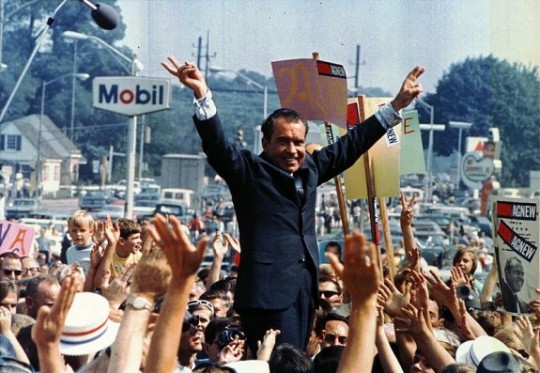
As the 1960s rolled to a close and with the Vietnam War proving itself to be increasingly unpopular amongst the American public, in 1968 President Lyndon B Johnson began secret talks with the North Vietnamese to begin the process of ending the conflict.
Unfortunately for the people of Vietnam and... pretty much everyone directly involved, Richard M Nixon was running on a platform of ending the war as well at the time and the Vietnam War ending too soon under a Democratic president wouldn't do his campaign any good... So naturally, the staff in Nixon's election team were instructed to sabotage the proceedings.
In a telephone conversation with H. R. Haldeman, an aide who would go on to become White House chief of staff, Nixon gave instructions that a friendly intermediary should keep “working on” South Vietnamese leaders to persuade them not to agree to a deal before the election, according to the notes, taken by Mr. Haldeman.
Additionally, it was discovered via the FBI bugging the phone calls between the South Vietnamese ambassador and of Anna Chennault, one of Nixon’s aides, that she had been advised to do the same things ahead of prospective peace talks that were planned to take place in Paris.
Johnson, who habitually recorded his own telephone conversations, is on tape as having been aware of what Nixon and his people were up to, and needless to say he wasn't exactly happy.
In the recently released tapes, we can hear Johnson being told about Nixon’s interference by Defence Secretary Clark Clifford. The FBI had bugged the South Vietnamese ambassadors phone. They had Chennault lobbying the ambassador on tape. Johnson was justifiably furious — he ordered Nixon’s campaign be placed under FBI surveillance. Johnson passed along a note to Nixon that he knew about the move. Nixon played like he had no idea why the South backed out, and offered to travel to Saigon to get them back to the negotiating table.
Despite it being a matter of record that Nixon's presential campaign was trying to prolong the very war he was promising to end, Johnson unfortunately chose not to make said evidence public. Partly because this would mean he'd have to admit to spying on the South Vietnamese ambassador, partly because he thought that his vice president Hubert Humphrey was a lock to win the next election so Nixon wouldn't be a problem anymore, and allegedly because Johnson believed that revealing Nixon's actions would cause the public to loose faith in the government...
Unfortunately, by the time the election finally rolled around, Nixon won the popular vote against Humphrey by just 1%. At that point, despite/due to placing Henry Kissinger in charge of the peace talks to end the war on Nixon's terms, the fighting continued for an additional five years with bombing spreading into neighbouring Laos and Cambodia, resulting in thousands more deaths.
As Robert Evans of the Behind the Bastards podcast put it on their series of episodes about Kissinger, the issue was basically that while Nixon wanted to get out of Vietnam, Vietnam wanted America out of Vietnam, and the American public wanted America out of Vietnam, both Nixon and Kissinger didn't want to leave in a manner that made it look like they'd lost. Hence the escalation in fighting and bombing, because they'd gotten themselves stuck in a situation they had no easy solution to escape.
AND YET, it could have gotten worse.
In some tapes released by America's National Archives from 1972, between his complaining about Jews and liberals to Kissinger (yes, he was aware Kissinger was Jewish, yes he called him antisemitic stuff to his face), Nixon brought up a new suggestion...
Nixon is heard discussing an extension of bombing raids over North Vietnam with Henry Kissinger, the national security adviser. Then, rather abruptly, he says: "I'd rather use the nuclear bomb." Whether Nixon was serious or trying to provoke Mr Kissinger is not clear. In his baritone voice, his adviser replies: "That, I think, would just be too much." But Nixon then goes on: "The nuclear bomb. Does that bother you? I just want you to think big."
The Vietnam War eventually came to a close on 30th April 1975, seven years after Nixon sabotaged an attempt to begin ending the war sooner.
20 notes
·
View notes